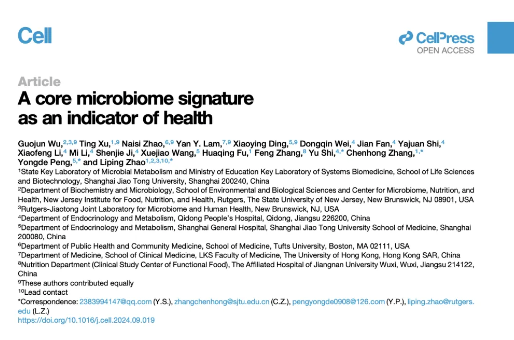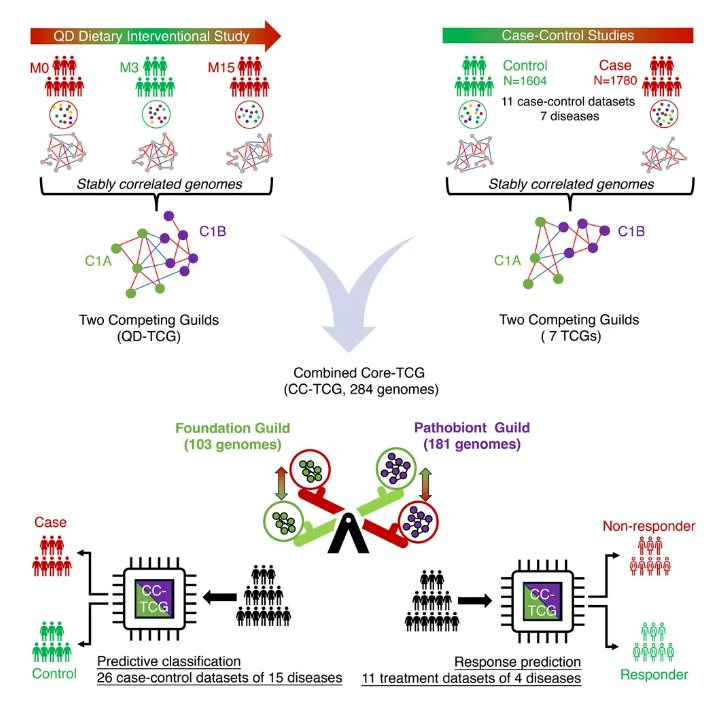- News
Cell Publishes Breakthrough Research Results by Professor Peng Yongde's Team at Shanghai General Hospital in Collaboration with Professor Zhao Liping's Team at Shanghai Jiao Tong University
https://mp.weixin.qq.com/s/fm2oGVR0ZPW-SFRTyI-VHA

The gut microbiota is an essential “special system” of the human body. It develops throughout a person’s life, existing in a dynamic symbiotic relationship with the host. On October 7th, Cell published the groundbreaking research findings of the team led by Professor Peng Yongde, a key figure in the Department of Endocrinology and Metabolism at Shanghai General Hospital, in collaboration with Professor Zhao Liping’s international research team from the School of Life Sciences and Biotechnology at Shanghai Jiao Tong University. The research marks years of progress in the field of chronic disease prevention and gut microbiota.
For the first time, the study identified two core bacterial groups essential for maintaining human health: a beneficial functional group associated with disease remission (named the “Keystone Functional Group”) and a functional group linked to disease deterioration (named the “Pathogenic Functional Group”). The study found that these two core groups form a “seesaw-like” pattern, where their fluctuations influence and predict human health. This suggests that the gut microbiota acts as an “interaction point” between environmental factors and the host, playing a crucial role in the development and progression of metabolic disorders when microbial balance is disrupted.
The research team also developed a probabilistic prediction system to assess the degree of microbial imbalance. Furthermore, they discovered that targeted nutritional interventions, which adjust the proportions of these functional groups in the gut, can more effectively prevent and treat diseases related to microbial dysbiosis.
This research achievement has made breakthroughs in interdisciplinary studies combining medicine and engineering in three key areas: scientific hypotheses, research strategies, and analytical techniques. It introduces a novel data analysis method for microbiome research, offering potential breakthroughs in precision medicine with a new focus on the "gut." Furthermore, it contributes to interdisciplinary collaboration in health management under the "Medicine + X" model, providing hope for overcoming bottlenecks.

In terms of translational application, the findings have the potential to serve as a "barometer" for assessing gut health and could drive the development of personalized microbiome testing technologies. This would provide new tools and pathways for precision health management and early disease intervention.
The "Medicine + X" model, as introduced, is an innovative collaboration framework in modern healthcare. It emphasizes the integration of medicine with other disciplines to foster the development of new technologies and methods. Consequently, the approach to chronic disease prevention and control is shifting from the traditional "conventional medicine–evidence-based medicine" model toward a "precision medicine–intelligent medicine" paradigm focused on comorbidity management.

Over the years, Professor Peng Yongde's team has established a multidisciplinary biomedical engineering research group comprising experts in basic science, clinical medicine, translational research, and epidemiology. This effort was supported by key interdisciplinary projects between medicine and engineering at Shanghai Jiao Tong University, projects from the Shanghai Shenkang Hospital Development Center, and multiple rounds of collaborative initiatives between the commission and the hospital. With the assistance and facilitation of the Clinical Research Center at Shanghai General Hospital, the team achieved initial relevant outcomes as early as 2018 through a clinical cohort study at the Songjiang Community Health Service Center, which were later published in Science. Subsequently, the team extended their interdisciplinary research efforts at Qidong People's Hospital in Jiangsu Province, part of the Shanghai General Hospital Medical Group, achieving a series of new breakthroughs.
